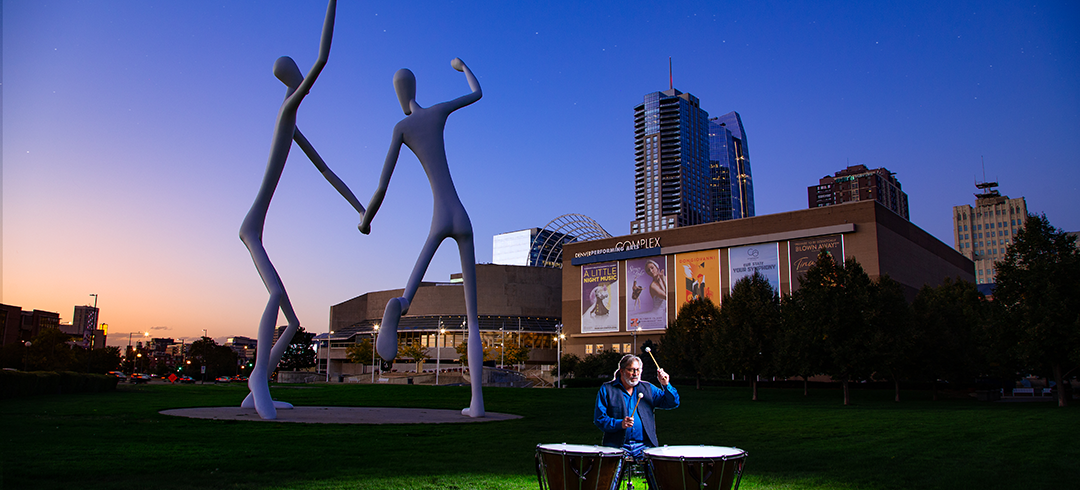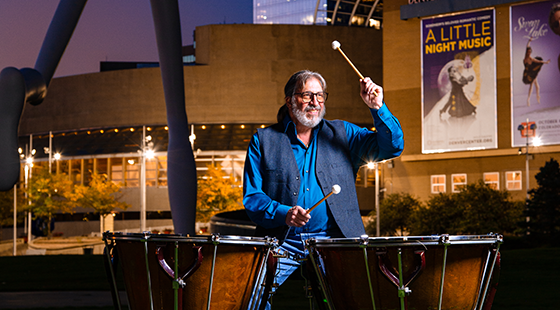There are lives lived in rhythm and there are those that shape the rhythm itself. William Hill’s life has been the latter: shaping sound, shaping ideas, shaping the very heartbeat of an orchestra. For 45 years, he has stood at the center of the Colorado Symphony’s sonic world, not merely keeping time but transforming it. A timpanist, composer, and educator, Hill has left an indelible mark on the Symphony and the broader musical community in Colorado. As he prepares to retire at the close of this season, his story invites reflection – not only on a distinguished career defined by deep passion, relentless dedication, and boundless creativity, but on a legacy that will continue to reverberate long after the echos of his final mallet strikes fade.
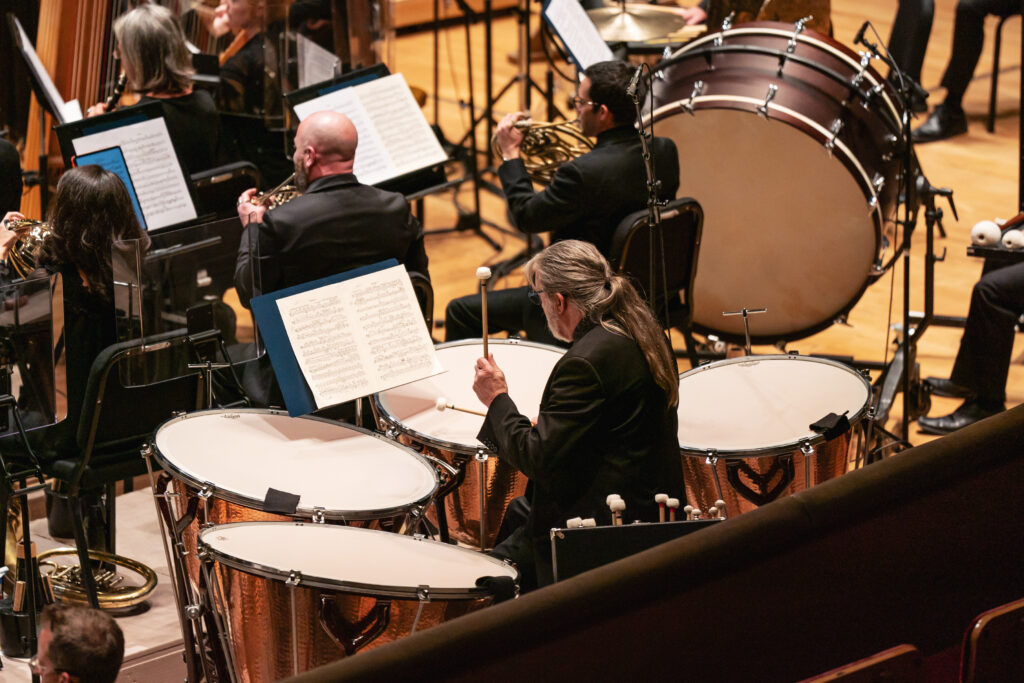
Hill’s love for music began at an early age. “I actually started playing drums a little bit when I was four years old,” he recalls. His parents, perhaps weary of his early rhythmic explorations on pillows and household objects, gave him a practice pad, a pair of sticks, and a book with one simple condition: “My dad told me if I would practice every day for a year, I could get a real drum.” Instilling that early discipline set the foundation for a lifetime of musicianship.
His first public performance was a snare drum solo in his church Christmas pageant at age 6, performing “Little Drummer Boy.” However, despite his early interest in rhythm, Hill initially struggled with traditional musical training. “I was a terrible piano student, preferring improvisation to practicing scales and arpeggios,” Hill laughs. But his struggles with practice eventually developed into a strength. “My piano teacher was very patient and encouraged me to compose more and more. I learned my piano pieces but never did master arpeggios.” That impulse toward composition would later help define his career.
His introduction to orchestral percussion came in his early teens. “The first time I played timpani, I think I was probably 12 or 13, and something about the big drums and the fact that they had to be tuned so you had to use your ears just really, really was fun to me.”
The skills, talent, and dedication that would eventually carry him to concert hall stages across the world were already evident as he won first place in his high school talent contest in 8th grade for a drum set solo, and won full scholarships to Cannon Music Festival at age 14 and Brevard Music Center at age 15.
His burgeoning love for music led him to pursue orchestral studies during his college career, earning a Bachelor of Music with high distinction from Indiana University and a Master of Music from the Cleveland Institute of Music. Following his distinguished academic career, he won the audition for the Denver Symphony’s open Principal Timpani seat in 1980, setting the stage for a lifetime of music and memory making, for both him and audiences in Colorado.
“It’s our job as performers, conductors, composers, any type of artist, to create magic, to take our audience and ourselves beyond everyday life into a place of higher consciousness, a place where things can form in our imaginations that can’t be duplicated in the tangible world.”
William Hill, Principal Timpani
Over the course of five decades with the Colorado Symphony, it’s been the opportunities to work alongside his talented colleagues that he’ll remember most. “I’ve played here now for 45 years,” he reflected, adding with admiration, “As I’ve gotten older, the age of the orchestra has gotten younger, and I have to say the young people are fantastic players and have fantastic attitudes.”
Peter Oundjian, the Colorado Symphony’s Music Director Designate, who has worked with Hill for many years, reflected on his remarkable legacy.
“Bill is an extraordinary musician whose artistry and leadership have shaped the very soul of the Colorado Symphony,” said Oundjian. “As a timpanist, his precision, musicality, and deep understanding of orchestral color have elevated countless performances over the years. But beyond that, his impact as a composer and mentor has left an indelible mark. Bill’s dedication over the past 45 years is truly remarkable, and while we will miss his presence on stage, his influence will resonate through this orchestra for generations to come.”
“Bill’s dedication over the past 45 years is truly remarkable, and while we will miss his presence on stage, his influence will resonate through this orchestra for generations to come.”
Peter Oundjian, Music Director Designate
Among the many musicians who have shared the stage with Bill Hill over the decades, few have witnessed his artistry, dedication, and spirit more closely than Concertmaster Yumi Hwang-Williams. Her admiration goes beyond professional respect—it’s rooted in years of shared performances, camaraderie, and the powerful musical presence he brought to every concert. As she reflects on his retirement, her words capture both his legacy and the deep personal connections he leaves behind:
“Bill Hill has been an icon holding court in the back of our big stage and bringing all the drama that the timpani provides at every concert for forty some years,” Hwang-Williams said. “His multitude of talents in all areas of music, his life affirming attitude and spirit, his dedication to the Colorado/Denver Symphony will be greatly missed, but our friendship will continue!”
Throughout his career, Hill has had the great fortune to share his love of music with his family. His wife, Natalie, was a full-time member of the Colorado Symphony for two years and a substitute musician for many more. Currently concertmaster of the Lone Tree Symphony, she’s also performed with the Colorado Ballet, Opera Colorado, and been soloist for performances with the Evergreen Chamber Orchestra and Greeley Chamber Orchestra.
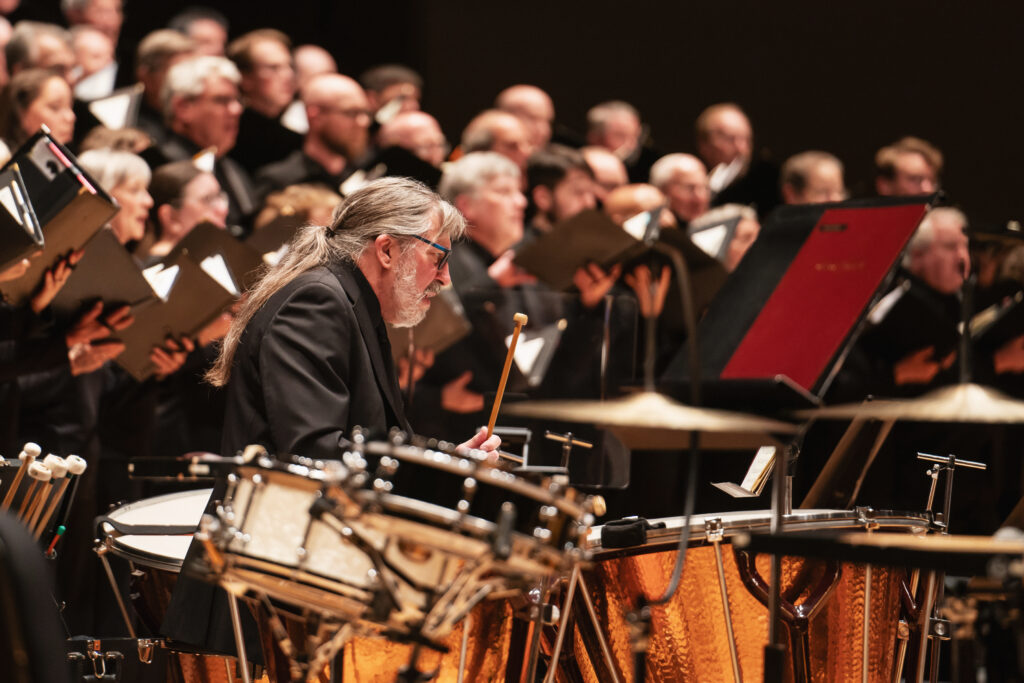
His children have followed musical paths as well. “We did not try to push either of our children to be musicians – we know the difficulties of making a living as a musician,” he explains. His daughter, Nadya, has degrees in violin and voice with highest distinction from the University of Michigan on a full scholarship, a Masters in opera voice from CU Boulder, and has been a soloist on voice with the Colorado Symphony several times, including as the soprano soloist in one of Hill’s own compositions, “Three Wings,” which opened the Symphony’s 2018/19 classical series. Her husband, Michael Hoffman, was a first-place winner of the Denver Lyric Opera Guild competition, is an influential vocal teacher, and has been an in-demand tenor for numerous organizations including the Colorado Symphony, Colorado Bach Ensemble, and Central City Opera.
His son, Colin, is also a percussionist and composer with two Indy Bands: VCO and Myriad DF. In high school, he was the recipient of the Louis Armstrong Outstanding HS Jazz Musician award, and he earned a bachelor’s degree in jazz studies from CU Boulder. He has composed electronics for two pieces with his dad’s orchestral writing: Soundscape #1 The Ming Prophecy for the Evergreen Chamber Orchestra and Passages for the Colorado Symphony.
Even his two-year-old granddaughter Roselyn is a star attraction, singing and dancing and playing drums and piano in the family’s living room. “The entire family loves to do house and small group recitals as a unit, and boy, do we cover a wide range of music,” he laughs. “Much of my life, I’ve been making music with my wife and my two children – it’s hard for me to even imagine anything better.”
“Much of my life, I’ve been making music with my wife and my two children – it’s hard for me to even imagine anything better.”
William Hill, Principal Timpani
Over the years, Hill has dedicated himself to countless hours of rehearsal, performance, and composition. “Earlier in my career, I would spend 70 hours a week doing music,” he shares, acknowledging that most musicians, staff, and crew at the Symphony put in far more time than they are compensated for. “That’s what it takes to have a great Symphony Orchestra – it takes musicians and staff and stage crew and a community that are all very dedicated and believe that this is an important thing in the community and needs to be supported.”
Prior to joining the Colorado Symphony, Hill also served as Principal Timpanist with the Honolulu and Omaha Symphonies, and in the year’s since has served in that capacity for the Colorado Music Festival, Grand Teton Music Festival, and the St. Paul Chamber Orchestra. Hill was appointed as Music Director of the Evergreen Chamber Orchestra in 2014 after guest conducting them the two previous seasons and continues in that role today. He’s also served as a composer with the National Music Festival, Ohio Chamber Orchestra, Denver Chamber orchestra, Cheyenne Symphony, Colorado Music Festival, Strings in the Mountains Festival, Grand Rapids Symphony, Denver Public Schools, Moravian Philharmonic, Academy in the Wilderness Chamber Orchestra, Evergreen Chamber Orchestra, and the Nova Series of Salt Lake City.
A multi-instrumentalist, Hill has been featured with numerous orchestras as a soloist on timpani, marimba, vibraphone, drum set, and multiple percussion concertos. He is equally at home in classical, jazz, pop, folk, and world music idioms. Hill’s first solo CD, Rhythms of Innocence, featured him on over 75 percussion instruments, recorders, wood flutes, didjeridoo, and piano. His jazz compositions have been featured in live performance on Colorado Public Television, and his compositions are regularly played on NPR stations
He has also performed on a variety of ethnic instruments, from the Middle Eastern doumbek to the Brazilian pandeiro and the Irish bodhrán. His appreciation for global rhythms speaks to his broader philosophy – music is a universal language, capable of bridging cultures and generations. This appreciation for the music of different cultures led Hill to co-create and name the Symphony’s annual Drums of the World show which has become an audience favorite.
One of Hill’s longtime colleagues and collaborators, Principal Percussionist John Kinzie, reflected on their 40 years together, so often side-by-side in the back row of the orchestra at Boettcher Concert Hall.
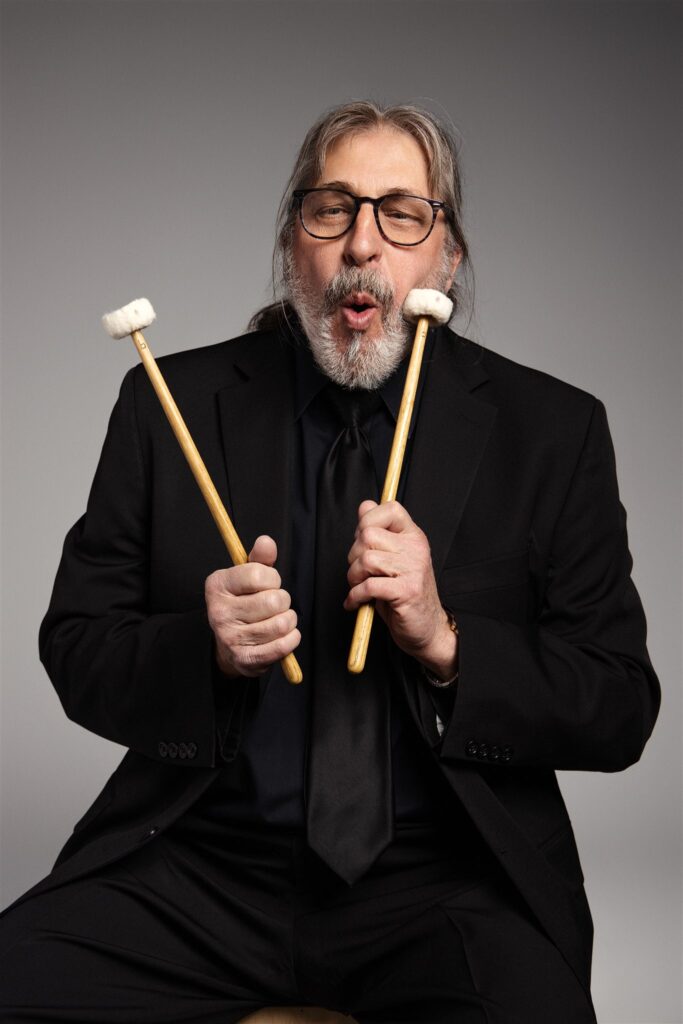
“I have had the extreme pleasure of playing alongside my friend and colleague, Bill Hill, since January of 1985,” said Kinzie. “He is the epitome of professionalism, a true music lover, and incredible technician on his very challenging instrument. Bill has always had an excellent ear, able to tune with the orchestra even as the pitch would sometimes climb during a performance. He’s had the most beautiful sound and always chose an appropriate touch for the current style of music the orchestra was performing. In our early years, Bill’s fiery approach to conductors was always entertaining for us colleagues and earned much respect from the conductors. We’d collectively giggle when he would add a glissando during discussions with the conductor. Bill has set the bar extremely high for that hot seat in the orchestra, and I will miss working with him dearly.”
While performing has been central to his career, one of Hill’s true passions lies in composition. “Composing is probably my greatest joy in music and the Colorado Symphony has performed more than 50 of his works over the years,” he says. For Hill, the process of writing music is a deeply introspective process: “To go deep into yourself to try to create something meaningful and then have your excellent professional colleagues and the audience as well appreciate what you’ve done is… beyond my wildest dreams.”
His works often explore profound themes, such as his orchestral setting of Edgar Allan Poe’s The Raven. “When you write something on a really dark subject under the theme of human loss, you know you’re taking a chance – you’re putting your soul out there.” The reward, however, comes in the response. He describes the experience of hearing the piece fade away into silence, followed by thunderous applause: “You feel like, wow, what I wrote and what we created together – all the musicians – really was understood.”
His more than 200 compositions are regularly performed and have been recorded by orchestras, chamber groups, and world music and jazz groups in settings from concert halls to clubs to outdoor and even street corner locations. The compositions cover a wide range of styles from symphonies, to experimental and improvisational pieces, to works combining acoustic instruments with various synthesizers and other electronic effects.
“Bill Hill’s resounding reputation as an extraordinary timpanist is only one part of my experience with him. My more important — and exciting — work with Bill has been as composer,” said Duain Wolfe, Founder and Conductor Laureate of the Colorado Symphony Chorus. “I had the privilege of premiering several of his pieces for chorus and orchestra, the most important one is his setting of Edgar Allen Poe’s THE RAVEN. Bill has an uncanny sense of the interior of texts. His genius is sensing the inner core of texts and then making them musically effective and communicative. What a powerful and rewarding experience this has proven to be for chorus and orchestra musicians as they bring his music to life.”
“What a powerful and rewarding experience this has proven to be for chorus and orchestra musicians as they bring his music to life.”
Duain Wolfe, Founder and Conductor Laureate of the Colorado Symphony Chorus
Hill has also been a dedicated educator, teaching music composition at the University of Denver’s Lamont School of Music for over two decades before retiring in June 2020. During that time, he advised young composers with both encouragement and realism: “If you’re not a fanatic about this, you probably should not be doing it.”
Beyond personal dedication, he believes orchestras have an essential role in preserving and shaping cultural heritage and likens attending a concert to a fleeting yet transformative experience.
“One of our former music directors put it wonderfully – he said we have to remember that in Mozart’s day, in Beethoven’s day, people would go hear a concert and they would hear the music that was being played for the very first time ever… and probably also the last time ever in their life that they would hear that music. That experience of being in the concert hall – whether you’re on stage or in the audience – has happened, and it’s gone. The concert ends, and it cannot be brought back. That is what makes it special.”
A musical renaissance man in the truest sense of the word, Hill’s long and successful music career has been a constant balancing act between several different pursuits. “Although I’ve said composition is my most enjoyable part of music, I always juggle performance, composition, conducting, teaching, some visual artwork, and sometimes multimedia creative projects with music and visuals. I also enjoy playing with words for lyrics, poetry, funny uses of olde English and Scottish words, essays, texts for larger works, influenced by mythology, Hildegard von Bingen, Shakespeare, various cultures’ philosophies, Native American, Australian First People, African, Norwegian, various religious/philosophical texts….the list goes on!”
As Bill Hill prepares to take his final bow after 45 seasons with the orchestra, he reflects not just on the passage of time, but on the philosophy that has guided his life in music. With characteristic humility and depth, he speaks of the countless performances, the pursuit of excellence, and the unwavering devotion to the art form that has defined his career. In his own words, he captures the essence of a life spent in service to music, to his colleagues, and to the audiences who have shared in the journey
“Playing in the Denver/Colorado Symphony for 45 years has been a joy, a passion, and just simply a way of life.”
William Hil, Principal Timpani
“Playing in the Denver/Colorado Symphony for 45 years has been a joy, a passion, and just simply a way of life. It is never completely easy, but great art never is. No matter how many times we’ve performed a particular piece, I try to always remember that the audience that’s here right now deserves that we give our best efforts, every single time. Trying to maintain that over many years and somewhere around 7,000 concerts is a challenge and also very rewarding. It has been a wonderful experience to watch the orchestra and the organization as they evolve. The orchestra has always been very, very good, and over the years we’ve attracted many really amazing young players. Every single musician is an artist of the highest level and my respect for each and every player has just grown as I’ve gone from being one of the youngest to one of the oldest. I’ve always told my students that we should constantly strive for perfection…and remember that it does not exist. With that in mind, I do take pride in trying to achieve a high level of balance in both effort and results.”
From the moment he picked up his first drumsticks as a child to his five decades-long tenure with the Colorado Symphony, Hill’s journey has been one of relentless passion, creativity, and excellence. His retirement marks the end of an era for the orchestra as his decades of musicianship have helped shape the ensemble’s identity and inspired countless musicians along the way. Though he may be stepping off the stage, his music and influence will continue to reverberate through the Symphony and beyond, forever the heartbeat of the orchestra.
Experience Bill Hill’s Final Colorado Symphony Performances
Join your Colorado Symphony for Principal Timpanist Bill Hill’s final performance with the orchestra, May 30 through June 1, 2025.

